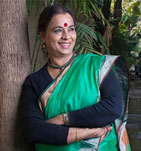Director's Note

The team at CSR is hard at work with a much stronger resolve to make gender equality a possibility. We are working on an important study for the purposes of mainstreaming gender in India’s Foreign Policy, in the areas, Health & Humanitarian Aid, Environment & Climate Change and Trade & Commerce. An ambitious and a bold new approach is needed when it comes to truly creating a transformative change that is required for achieving women's fundamental rights and freedoms.
As a follow up we organized a roundtable with Key key stakeholders for a policy dialogue to present the research and explore further steps to promote gender mainstreaming in various aspects of Indian Foreign Policy. With support from the Asia Foundation, this project seeks to understand what a feminist approach in India’s foreign policy would look like Economic independence for women as its core objective, our Centre for Excellence for Women’s Skill Development saw successful completion of its batches of Office Assistant Trainings, adding to the almost 2000 Youth trained in the last 3 years. I can see CSR’s Centre of Excellence is making huge strides empowering women presenters and even more in the near future that is required for achieving women’s fundamental rights and freedoms. Efforts aimed towards ending poverty and inequality will not be effective unless underlying structures are identified and tackled. A transformative approach is needed that focuses on women (especially from the Global South), such that they are in a position to transform discriminatory structures and social norms that form the under currents of poverty and inequality. It is important to note that it is these women at the grassroots that know their communities and culture, best and know what can be done to advance women’s rights and empowerment. Therefore, what is needed is support and resources so that they can put their locally grounded solutions to implementation.
As a follow up we organized a roundtable with Key key stakeholders for a policy dialogue to present the research and explore further steps to promote gender mainstreaming in various aspects of Indian Foreign Policy. With support from the Asia Foundation, this project seeks to understand what a feminist approach in India’s foreign policy would look like Economic independence for women as its core objective, our Centre for Excellence for Women’s Skill Development saw successful completion of its batches of Office Assistant Trainings, adding to the almost 2000 Youth trained in the last 3 years. I can see CSR’s Centre of Excellence is making huge strides empowering women presenters and even more in the near future.
Efforts towards conservation of our environment continues, we are in phase 4 of our initiative in Rajasthan where the team is working with elected women representatives (EWR) and self help groups (SHG) for sustainable water resource management and restoration.
My team’s efforts towards Digital Safety and Online Wellbeing are advancing consistently. We saw new partners join our efforts and support the cause. I would like to encourage you to become part of the solution and help in the ongoing research by filling a short survey.
There is significantly more that the team has achieved that I would implore you to read below.